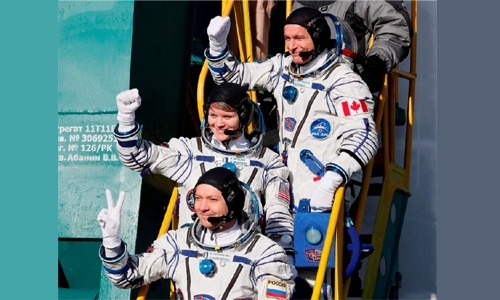Soyuz heads to ISS on first manned mission since failure
A Soyuz rocket carrying Russian, American and Canadian astronauts took off from Kazakhstan and reached orbit on Monday, in the first manned mission since a failed launch in October. Russian cosmonaut Oleg Kononenko, Anne McClain of NASA and David Saint-Jacques of the Canadian Space Agency blasted off for a six-and-a-half month mission on the International Space Station at the expected time of 1131 GMT.
A few minutes after their rocket lifted off from the Baikonur Cosmodrome, Russian space agency Roscomos announced that the capsule was “successfully launched into orbit”. NASA administrator Jim Bridenstine confirmed on Twitter that the crew were “safely in orbit” and thanked the US and Russian teams “for their dedication to making this launch a success”. It was the first manned launch for the Soviet-era Soyuz since October 11, when a rocket carrying Russia’s Aleksey Ovchinin and US astronaut Nick Hague failed just minutes after blastoff, forcing the pair to make an emergency landing.
They escaped unharmed but the failed launch -- the first such incident in Russia’s post-Soviet history -- raised concerns about the state of the Soyuz programme. The Soyuz is the only means of reaching the ISS since the United States retired the space shuttle in 2011. Kononenko, McClain and Saint-Jacques showed no signs of worry as they boarded a bus to take them to the launch. They smiled and waved, with SaintJacques blowing kisses and giving the thumbs-up to a crowd of well-wishers. At a press conference on the eve of the launch, crew commander Kononenko said the astronauts “absolutely” trusted teams preparing for the flight.
Risk ‘part of our profession’
“Risk is part of our profession,” the 54-year-old said. “We are psychologically and technically prepared for blast-off and any situation which, God forbid, may occur on board.” McClain, a 39-year-old former military pilot, said the crew looked forward to going up. “We feel very ready for it,” she said. Saint-Jacques, 48, described the Soyuz spacecraft as “incredibly safe”.
The accident highlighted the “smart design of the Soyuz and the incredible work that the search and rescue people here on the ground are ready to do every launch,” he said. Of the trio set to reach the ISS six hours after blast-off, both Saint-Jacques and McClain are flying for the first time. Kononenko is beginning his fourth mission to add to an impressive 533 days in space.
The veteran said the crew would conduct a spacewalk on December 11 as part of an investigation into a mysterious hole that has caused an air leak on the ISS.
Related Posts

